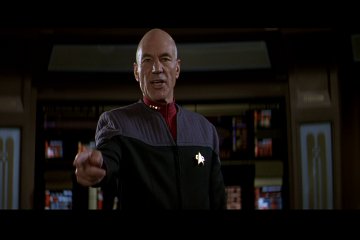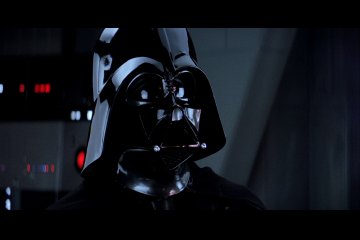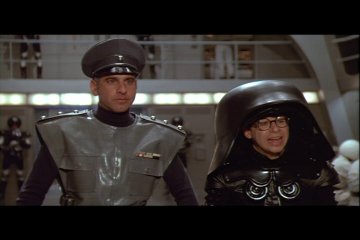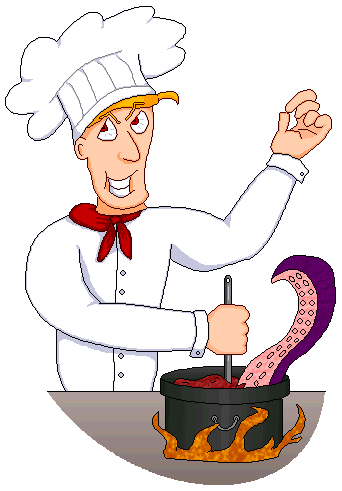The Chef’s Top Ten Science Fiction Movies
December 19, 2007
Since the Maitre d’ and the Busboy have posted their share of reviews and it’s been a while since I wrote one myself (despite my cameo very special guest star appearance in the review of Cleopatra 2525, what has to be one of the worst sci-fi series ever), I figured it was about time the Chef stepped in and took a piece of the action. Lately, I’ve been watching a lot of science fiction, and I decided to share a rundown of what I consider to be some of the best or most influential movies ever made in the genre. Besides, we’ve spent enough time reviewing bad to downright awful things, and it’s high time we posted a review about stuff we do like.
Sadly, Armageddon didn’t make the cut. I wanted to put it in, but I realized that in the end, Bruce Willis and a bunch of rednecks blowing up an asteroid to Aerosmith music just wasn’t top ten material. It’s at #11, in case you were wondering, right above Plan Nine From Outer Space, which is breathtaking in its sheer brilliance.
I’m far from a movie expert, and I generally have issues with most film critics. My tastes are, in fact, quite suspect. However, here are the Chef’s ten favorites. I’ve deliberately avoided things that are more properly put into the horror or fantasy categories, but truth be told those divisions are all kind of arbitrary anyway. Here, we’ll stick to traditional science fiction-y themes like time travel, spaceships, robots, and tentacled aliens from Planet X who want to take sexual advantage of Japanese schoolgirls (It’s those uniforms. They are irresistible to anything with tentacles.). There are some obvious choices on the list, along with ones that prey on my particular obsessions, so be warned. This is far from a fair and balanced list (not that I expect this to be airing on Fox News anytime soon).
Note that these aren’t in any certain order. I’d have trouble actually applying any kind of ranking to them. It’s enough that I managed to narrow this list down to ten.
Star Trek: First Contact

“I did fucking
Shakespeare, now stop asking me
how many bathrooms the
Enterprise has, goddammit!”
Many Trekkies will claim that Wrath of Khan is the best Star Trek movie. However, while it’s aged reasonably well, Wrath of Khan doesn’t measure up to its latter-day heir. Yes indeed, First Contact is the Next Generation equivalent of Khan – second movie in the series, more action-oriented and darker than its predecessor, the captain and the enemy having a personal relationship, so forth and so on, an nauseum. Of course, First Contact has 200% fewer dead Vulcans, but it can’t win in all departments. However, the truth is that First Contact succeeds when by all rights it should be a failure.
In the first place, First Contact is a time travel story. While I’m a big fan of time travel and despite my better judgment I still like Star Trek (Firefly and the new Battlestar Galactica have me spoiled.), as a rule I don’t like most Trek episodes that involve the subject. There have been some good ones (say, “Yesterday’s Enterprise” or “Little Green Men“), but the vast majority are abominations like “Future’s End” or “Carpenter Street“. And yes, I’m aware that both “Carpenter Street” and “Future’s End” are poor ripoffs (the Trekkies would say “homages”, which coincidentally sounds like “fromage”) of The Voyage Home…and I’m not really fond of that one, either. Apparently, Vulcans attempting to blend in on modern-day Earth speaks to the core fan base in deep and meaningful ways. Considering that your average Trekkie is an even bigger social cripple than Spock or T’Pol, that’s saying something.
So anyway, strike one. Even though it doesn’t involve going back to modern-day, it’s still a time travel story. Strike two is the fact that it’s supposed to be darker and have more “action” than its predecessor. This hasn’t always worked out well for Star Trek. Despite Wrath of Khan‘s success on both counts, most attempts to make Trek an action franchise instead of science fiction allegory (see Voyager and Enterprise) have failed more miserably than Fred Thompson’s presidential campaign. “Dark” and “Star Trek” don’t usually mix (never mind that Deep Space Nine worked precisely because it was dark and un-Trekian).
Strike three is the Borg. Although worthy of being big-screen villains, the Borg lacked a “human” face and leader. So, deciding that the majority of the human race is probably a bunch of perverts, the movie’s writers and producers sexed the Borg up by introducing the Queen. Among the Borg and Trekkies, a creepy, pale and hairless woman in a fetish bodysuit straight out of an S&M catalog counts as sexy.
Despite all of these, First Contact works well as a story. It explores one of the pivotal moments of Trek‘s future history, but more importantly, it combines the action with all-too-human themes.
The first of those themes is that, like Zefram Cochrane, our heroes from the history books were all human. They weren’t perfect and they all had their flaws, but they still had it in them to make contributions to mankind. To quote the captain of another science fiction franchise, “It’s my estimation that every man ever got a statue made of him was one kind of sumbitch or another.”
The second theme is a little more typical to Trekdom, but would be one more often associated with the likes of Kirk or Archer than the usual restrained-to-the-point-of-constipation Picard: revenge. Picard gets to confront an enemy that once stripped him of his very humanity. Picard’s Ahab-like obsession with destroying the Borg comes right to the point of dropping into melodrama, but doesn’t cross the line into pure cheese. Ironically enough, a few months after making this movie, Patrick Stewart did indeed go on to play Captain Ahab. The audience was 98% Trekkies. How does it feel to be a Shakespearean-trained actor, Patrick?
Star Wars – The Empire Strikes Back

“I find your lack of pants disturbing.”
There’s a rule somewhere that you can’t have a science fiction top ten list of any kind without having at least one entry related to The Great Gawd And Master George’s big franchise. So here it is, my choice for the best of Star Wars. And godsdammit, I liked the prequel trilogy.
So, why exactly is ESB the best Star Wars film? It’s because the good guys lose. In fact, they not only lose, but get their asses handed to them and spend the movie getting chased halfway across the galaxy. On top of that, Darth Vader sets a trap for Luke, and it works. Competent villainy is so hard to find in movies, but Vader has it in spades. If it wasn’t for the Emperor’s cackling incompetent arrogance in Return of the Jedi, Vader would have brought down the Rebellion by himself. But no, the dumbass Palpatine had to bring Luke in and try to turn him to the Dark Side. Look, Palpy, if the kid’s own father can’t twist him to evil, you’re not going to have a chance. It’s your own damn fault Vader got a conscience and chucked you down that reactor shaft. You should have left well enough alone.
And then there’s the love story. The budding romance between Han and Leia makes some who think all that mushy stuff has no place in science fiction roll their eyes (of course, the people who believe that are most likely eunuchs – lovely singing voices, though), but it works because it stems from the natural friction between the two. And the best of all is that neither of them ever break character – Han’s trademark reply of “I know” is true to his nature.
The heretics may say otherwise, but ESB proves that Star Wars is about more than flashy special effects and overblown John Williams music. And it has the bonus of no Ewoks or Gungans in sight.
Spaceballs

“How many assholes we got on this ship, anyway?”
A good parody should not only make fun of a certain genre, it should also be in itself a fine example of the genre. This is why Spaceballs works, and it’s why so many modern parodies (like the must-be-stopped-at-any-cost Scary / Date / Epic / Whateverthehellispopular Movie series) just don’t. Spaceballs not only makes fun of Star Wars-ian heroic space opera (as well as other subgenres of science fiction), but it is itself good Star Wars-ian heroic space opera. Like The Producers, it walks a fine line between laughs and real heart.
Plus, it gave us the immortal axiom: “Evil will always triumph because Good is dumb.” So very, very true.

About The Chef
The Chef was born 856 years ago on a small planet orbiting a star in the Argolis cluster. It was prophesied that the arrival of a child with a birthmark shaped like a tentacle would herald the planet's destruction. When the future Chef was born with just such a birthmark, panic ensued (this would not be the last time the Chef inspired such emotion). The child, tentacle and all, was loaded into a rocket-powered garbage scow and launched into space. Unfortunately, the rocket's exhaust ignited one of the spectators' flatulence, resulting in a massive explosion that detonated the planet's core, destroying the world and killing everyone on it.

Your host, hero to millions, the Chef.
Oblivious, the dumpster containing the infant Chef sped on. It crashed on a small blue world due to a freakish loophole in the laws of nature that virtually guarantees any object shot randomly into space will always land on Earth. The garbage scow remained buried in the icy wastes of the frozen north until the Chef awoke in 1901. Unfortunately, a passing Norwegian sailor accidentally drove a boat through his head, causing him to go back to sleep for another 23 years.
When the would-be Chef awoke from his torpor, he looked around at the new world he found himself on. His first words were, “Hey, this place sucks." Disguising himself as one of the planet's dominant species of semi-domesticated ape, the being who would become known as the Chef wandered the Earth until he ended up in its most disreputable slum - Paris, France.
Taking a job as a can-can dancer, the young Chef made a living that way until one day one of the cooks at a local bistro fell ill with food poisoning (oh, bitter irony). In a desperate move, the bistro's owner rushed into one of the local dance halls, searching for a replacement. He grabbed the ugliest can-can dancer he could find, and found himself instead with an enterprising (if strange) young man who now decided, based on this random encounter, to only answer to the name “Chef".
His success as a French chef was immediate (but considering that this is a country where frogs and snails are considered delicacies, this may or may not be a significant achievement). Not only was the Chef's food delicious, it also kept down the local homeless population. He rose to the heights of stardom in French cuisine, and started a holy war against the United Kingdom to end the reign of terror British food had inflicted on its citizens.
When the Crimean War broke out around France, the Chef assisted Nikola Tesla and Galileo in perfecting the scanning electron microscope, which was crucial in driving back the oncoming Communist hordes. It would later be said that without the Chef, the war would have been lost. He was personally awarded a Purple Heart by the King of France.
After that, the Chef traveled to America, home of such dubious culinary delights as McDonald's Quarter Pounder With Cheese. He immediately adopted the Third World nation as his new home, seeing it as his job to protect and enlighten it. When the Vietnam War began, he immediately volunteered and served in the Army of the Potomac under Robert E. Lee and General Patton. During the war, the Chef killed dozens of Nazis, most of them with his bare hands.
Marching home from war across the floor of the Atlantic Ocean, stark-naked and freezing, the Chef wound up on the shores of Mexico. He spent several years there, drinking tequila with Pancho Villa and James Dean. He put his culinary skills to the test when he invented the 5,000-calorie Breakfast Chili Burrito With Orange Sauce (which is today still a favorite in some parts of Sonora).
Eventually, the Chef returned to his adopted home of America, where he met a slimy, well-coiffed weasel who was starting up a new kind of buffet - one dedicated to providing the highest-quality unmentionable appetizers to the online community. The Chef dedicated himself to spreading the word of his famous Lard Sandwich (two large patties of fried lard, in between two slices of toasted buttered lard, with bacon and cheese), as well as occasionally writing about his opinions on less-important topics than food.
Every word of this is true, if only in the sense that every word of this exists in the English language.




